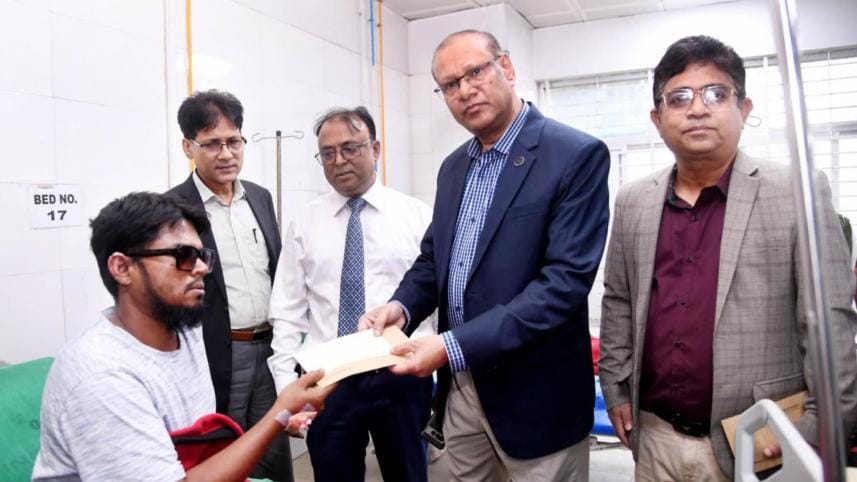When officials turn tragedy into a photo opportunity

A few men in jackets and ties walked into the Dhaka National Institute of Burn and Plastic Surgery. They came with envelopes containing cheques for the workers injured in the Mirpur fire.
When they gave it to the workers, one even appeared to smile at the camera while the secretary handed the envelope to a patient who could barely sit up.
Everyone was looking straight at the camera — as if it were a photo session, not a moment of pain.
They gave Tk 50,000 each to three injured workers. Among the government officials was labour and employment secretary, the top bureaucrat of the very ministry that failed to stop the tragedy.
Sixteen people died, as of Thursday, in that fire at the clothing factory and chemical warehouse in Mirpur's Shialbari.
Sixteen lives — not numbers, not files — gone. Families destroyed. Parents lost children, children their parents.
These were not just workers; they were people who woke up every morning to earn a living, to feed their families, to dream of a better tomorrow. These were among the poorest people in the city. They live in tiny tin rooms, work long hours, and risk their lives every day because they have no other choice.
When the fire came, it burned everything — their homes, their bodies, their dreams. Some now lie in hospital beds wrapped in white bandages, fighting for life. Others are gone forever, leaving behind nothing but ashes and grief.
Then came the officials. Not before the fire, when the factory was unsafe, but after — when the smoke had cleared and the cameras were ready. If the ministry had done its job, none of this would have happened. But instead of facing their failure, they went to the hospital, smiled for photos, and handed out money — as if guilt could be covered with cash.
This was not kindness. It was a show. How could smile? Don't they feel ashamed? These are the same officials who ignored the illegal warehouses running in the middle of residential areas.
Every time a factory burns, we see the same pattern — sympathy speeches, press releases, and committees. But when these same factories break laws, pile chemicals near workers, or force people to work in danger, no one cares.
If they only wake up after people die, what are they being paid for? Their duty is to stop such deaths before they happen. The Department of Inspection for Factories and Establishments (DIFE) under the labour ministry was put in place for this specific purpose. But in this country, "inspection" often means a visit for tea, a few signatures, and a quiet exit.
After every fire, we hear the same lines — "no permission," "we didn't know," "a committee is formed." This time too, there is another committee.
The labour secretary, who should be answering hard questions, went to hand out envelopes and pose for pictures. Is this his idea of responsibility?
If the victims were rich, there would be real investigations, arrests, and justice. But they were poor, so their deaths became headlines briefly — and then they were forgotten. This is not mercy. This is mockery — pretending to care while changing nothing. Because when the cameras are gone, the poor will go back to the same unsafe rooms, the same risks, waiting for the next fire.




 For all latest news, follow The Daily Star's Google News channel.
For all latest news, follow The Daily Star's Google News channel.
Comments